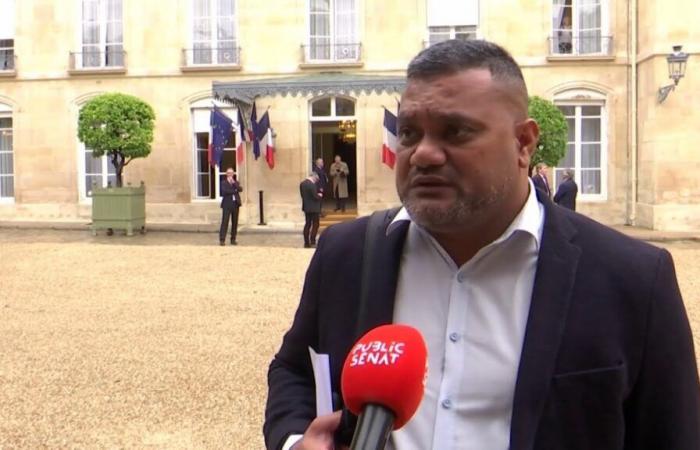
As a symbol, and why not the sign of a newfound appeasement, it was the deputy Emmanuel Tjiabou, the son of the famous independence leader, one of the fathers of the Matignon agreements in 1988, who introduced the working session of the Caledonian interinstitutional delegation received, this Thursday, at the presidency of the Senate. “We hope that this exchange will bring vitality […] of hope that we can write a new page.”
Around the table, representatives of the Congress and the Caledonian Senate, deputies and senators of the Archipelago, the presidents of the political groups of the upper house as well as the general rapporteur of the budget, Jean-François Husson. “It seemed important to us to receive your delegation. This gesture that we make together. It is a gesture of friendship, but it is also a gesture of listening,” declared Gérard Larcher.
The Caledonians are going to need to listen. There have now been 13 deaths in the Pacific archipelago since the start of the riots that broke out last May, after the Senate and the National Assembly adopted a constitutional bill aimed at expanding the electorate for provincial elections.
“Communities do not have the means to deal with this social crisis”
“This is a situation of great complexity that calls on the State to have an extremely active attitude in solidarity with all our compatriots in New Caledonia,” said LR senator Philippe Bas in charge of the file at the Upper House. “The emergency is the treatment of the economic situation and the treatment of the social situation with the restoration of civil peace. […] More than 30% of Caledonian businesses are currently inactive. There is a loss of resources for all communities which means that they do not have the means to face this social crisis.
Guillaume Gontard, the president of the environmental group, specifies that this plan “must bring into play national solidarity, similar to what was done after Hurricane Irma hit the Antilles in 2017. With an unemployment rate of almost 50% and social assistance schemes such as the RSA that do not exist in New Caledonia, there is a risk of famine, the elected officials have clearly told us so”, he reports.
As the Budget review approaches, Congressional representatives came to present to senators their five-year, cross-party reconstruction plan, adopted on August 28, which provides 4.2 billion euros over 5 years from the State to rebuild the archipelago. “We are on the eve of the societal collapse of our country […] Institutional, political and customary leaders of New Caledonia, even if we may have differences, we all agree on one point, that we will have to do everything possible to save New Caledonia from collapse,” warns Milakulo Tukumuli, third vice-president of the Southern Province, and president of Eveil océanien.
Also in charge of the Caledonian file, the vice-president (LR) of the Senate, Mathieu Darnaud promises that the Senate “will be particularly attentive to the quantification” of the credits. “The future and the economic recovery of New Caledonia are at stake.”
“The Caledonian file returns to Matignon as history would have it”
In a half-hearted manner, the record of Gérald Darmanin, the former Minister of the Interior, in charge of Overseas Territories for the last two years, is disavowed. His management of the institutional reform, already judged “too vertical” by the elected representatives of the upper house last spring, had set the powder alight. In this respect, the appointment to the post of Minister in charge of Overseas Territories in full exercise with the Prime Minister, of François-Noël Buffet (LR), the president of the Law Commission, an expert on the Caledonian file, is a “first piece of good news” for Milakulo Tukumuli. “The Caledonian file is returning to Matignon as history would have it. We know Mr. Buffet with whom we have exchanged a lot. He is a great listener. He is attentive to the Caledonian file. So we have confidence in the future”, insists Milakulo Tukumuli who hopes to meet Michel Barnier and François-Noël Buffet before the general policy speech.
“The Macron method has been called into question. It is not with three civil servants, however talented they may be, that the institutional future will be settled. There is a need for political support. We must return to the spirit of the Noumea Accords of 1998, give back control to the Caledonian people and include this territory in a process of decolonization,” argues Guillaume Gontard.
“Dialogue between Caledonians and an impartial State must be re-established”
While the dissolution put a stop to the constitutional revision contested by the independence supporters aimed at opening up the electorate, the institutional crisis is far from being resolved. The three referendums on the independence of New Caledonia, which saw the “no” vote win, must give way to negotiations between the stakeholders with a view to a global agreement on the future of the Archipelago. Negotiations that have been at a standstill for two years, in particular due to the rejection by the independence supporters of the institutional reform “imposed from above”.
This institutional subject was not at the heart of the discussions of the day but remains in the background. “If we do not organize the economic recovery and the management of social shock absorbers, we will have much more difficulty in creating the conditions for a fruitful dialogue […] We must open up the future. Dialogue between Caledonians and an impartial State must be re-established. And we are confident that Michel Barnier and François-Noël Buffet will embody it,” Philippe Bas insists. Under current conditions, the organic law that provides for the holding of the next provincial elections no later than December 15, 2024 seems difficult to apply at this stage. A decision by the Council of State had nevertheless set the government “a deadline” for organizing the provincial elections, set for November 30, 2025, but a new deadline for the vote will require the adoption of a new organic law before December.
At the end of the meeting, the President of the Senate, Gérard Larcher, indicated that Philippe Bas and Mathieu Darnaud would be “responsible for establishing a summary” of the day’s discussions. “I will take this summary to the Prime Minister because the New Caledonia file must be part of the agenda and the project that the Prime Minister will present to us in his general policy statement.”





